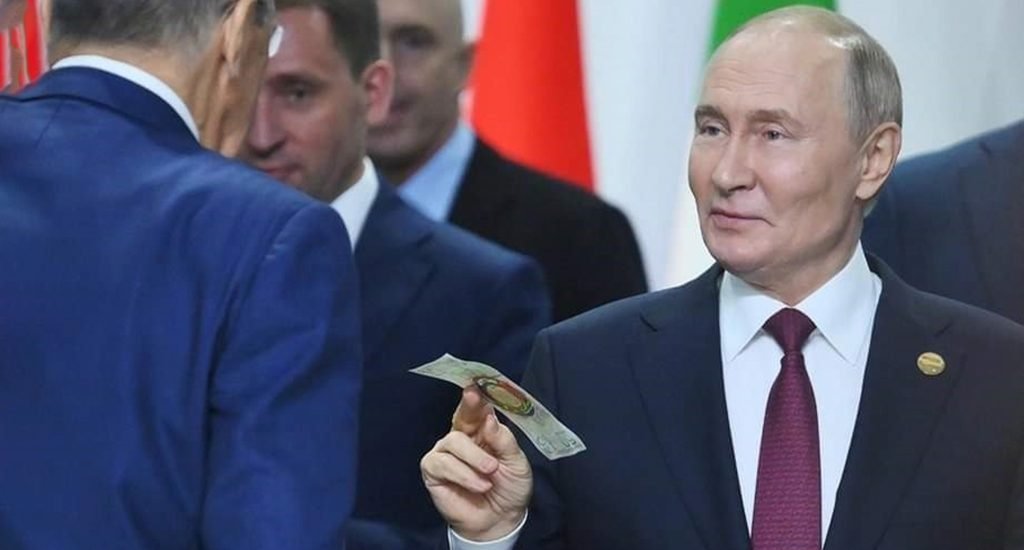A New Global Currency? Putin’s Push to Revolutionize BRICS
- Abeera Marium Siddiqui
- October 24, 2024
- 4:04 pm
- 24
- Current Affairs

At the recent BRICS summit in Kazan, Vladimir Putin called for a major shift in the global financial system. His goal? To reduce the world’s reliance on the U.S. dollar and establish an alternative international payment system. For Putin, the dollar has become a political weapon, and he believes it's time to change that. He said, “The dollar is being used as a weapon. We really see that this is so. I think that this is a big mistake by those who do this.”
But while Russia pushes for de-dollarization, not all BRICS members are convinced. Brazil and India, in particular, are cautious. They don’t want BRICS, a group that has grown to nine members, to turn into an anti-Western club that serves Russia and China’s interests. This balancing act is shaping BRICS's discussions. It involves global ambitions and neutral relations with the West.
The Case for De-Dollarization
Putin’s case for moving away from the dollar rests on what he sees as its misuse. The U.S. dollar dominates international trade and reserves, giving the U.S. immense leverage. This influence can translate into sanctions that can severely impact economies, as Russia knows well. By promoting an alternative, Putin aims to create a system less vulnerable to U.S. sanctions.
Currently, nearly 95% of trade between Russia and China is settled in rubles and yuan, bypassing the dollar. Russia is also working on a payment infrastructure that avoids the Belgium-based SWIFT system, which the U.S. has used to target Russian financial institutions. The idea is to build something more resistant to sanctions, but the success of this vision is far from certain.
The BRICS Alternative Payment System
One of the most talked-about initiatives at the summit was the idea of BRICS creating its own payment platform, possibly even a new currency. Using blockchain, the system could store and transfer digital tokens backed by the currencies of BRICS nations. This could reduce the need for dollar-based transactions and make cross-border payments more efficient.
However, there are hurdles. The BRICS countries are economically diverse. Brazil and India, in particular, are wary of becoming overly reliant on China’s yuan. Even experts doubt whether a BRICS currency can gain global traction. According to Agathe Demarais from the European Council of Foreign Relations, “At this stage, it is hard to imagine a widespread development and adoption of BRICS financial tools globally.” She also points out that over 80% of global trade transactions are in U.S. dollars, which also make up nearly 60% of central bank reserves.
That said, the bloc remains optimistic. Putin emphasized that new economic opportunities will emerge through the integration of digital currencies, not just for BRICS but for other developing economies too. BRICS is positioning itself as a catalyst for global growth, with more than 30 countries showing interest in joining the bloc.
Expanding BRICS: A Growing, Diverse Group
The BRICS summit didn’t just focus on financial systems—it also expanded its membership. Countries like Cuba, Bolivia, Vietnam, and even Turkey, a NATO member, are set to join. This growing diversity brings both opportunities and challenges. Brazil, in particular, has been vocal in trying to prevent BRICS from becoming too anti-Western. Speaking at the summit, Brazilian President Luiz Inácio Lula da Silva said, “Many insist on dividing the world into friends and enemies. But the most vulnerable are not interested in simplistic dichotomies.”
While the expansion is seen as a way to bring more global south countries into the fold, there are underlying concerns. Brazil and India want to ensure BRICS remains balanced and doesn’t become dominated by Russia and China.
Global Reactions: Caution and Criticism
The idea of BRICS developing its own financial tools has sparked concern in many parts of the world. Brazil and India are cautious about how these moves will play out. They don’t want to be seen as taking sides in a global power struggle. Moreover, financial experts remain skeptical about the feasibility of a BRICS currency, pointing out that it would unite countries with vastly different economies.
Meanwhile, the summit faced criticism from outside. UN Secretary General António Guterres attended the meeting, despite criticism from Ukraine. The Ukrainian government was unhappy that Guterres flew to Kazan to meet Putin, especially when he had skipped a Ukraine peace conference in July. Nevertheless, Guterres’ spokesperson insisted that his attendance did not signal a shift in his stance on the legality of Russia’s invasion of Ukraine.
The Future of BRICS
Despite the obstacles, Putin remains determined to push forward with BRICS’ financial initiatives. He sees digital currencies and alternative payment systems as part of a broader strategy to shift global economic power. However, the path ahead is uncertain. The BRICS nations are not united in their approach, and there are still significant questions about how much of the global financial system can realistically move away from the dollar.
BRICS is growing, and its influence is expanding, but whether it can reshape global finance remains to be seen. As the bloc continues to evolve, its ability to strike a balance between reducing dollar dependence and keeping its members aligned will be crucial. For now, the world is watching, and BRICS is making moves—but success is far from guaranteed.



